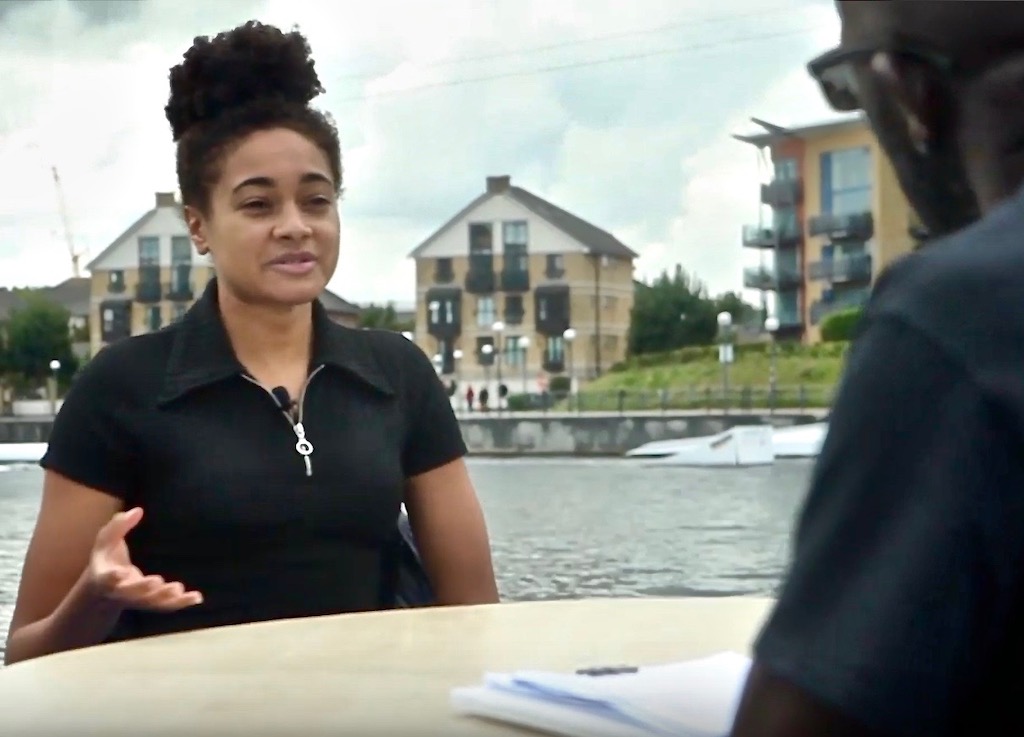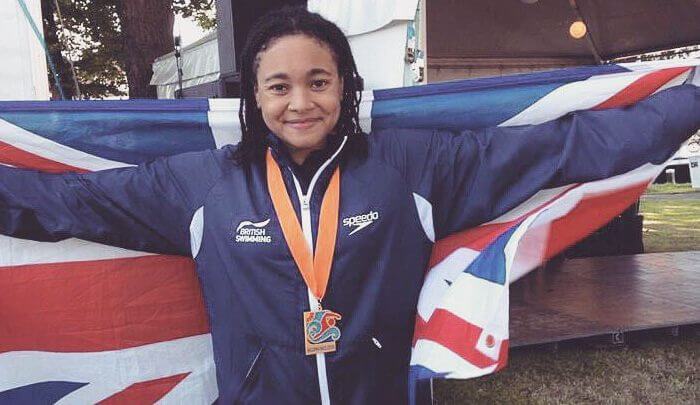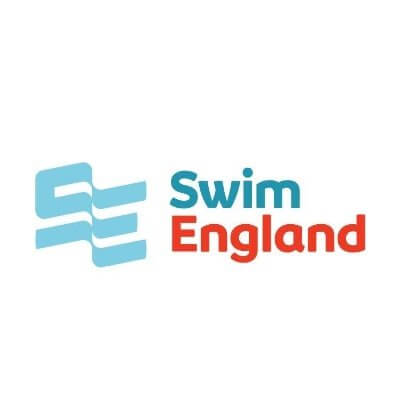Black Swimming Association Launches With Swim England To Encourage Participation & Prevent Drownings

The Black Swimming Association has officially launched in partnership with Swim England to highlight swimming as an essential life skill and to encourage participation as well as prevent drowning in black and minority ethnic communities.
Alice Dearing – who is seeking to become the first black female swimmer to represent Team GB at the Olympics in Tokyo in July – co-founded the BSA with BBC journalist and former swimmer Seren Jones, Ed Accura – who starred in and produced the film ‘Blacks Can’t Swim’ – and Danielle Obe, inventor of swim scarves that protect the hair.
The Swimming Teachers’ Association, the Royal Lifesaving Society and Nike Swim have also come on board with the BSA at a time when figures released by Sport England show that 95 per cent of black adults and 80 per cent of black children in England do not swim.
By comparison, 89% of white British adults and 70% of white British children between the ages of five and 16 do not swim regularly.
The survey asked 198,000 respondents each year whether they had gone swimming in the previous 12-month period, how frequently, and when they last went swimming.
The figures were taken between November 2016-2018 and November 2017-18 for children between the ages of five and 16.
In England, 87% of people who go swimming are white British, compared with less than 2% who are black.
Between the ages of five and 16, black children account for 3% of swimmers, compared with 72% for their white British counterparts.
Last year Swim England published figures in response to a Freedom of Information request by the BBC that 668 out of 73,000 competitive swimmers identified as black or mixed race.
Additional research shows the risk of drowning is higher among ethnic minority communities.
The under-representation of the BME community in swimming, coupled with the high number of water-related accidents, is believed to be partially attributed to affordability, accessibility, aquaphobia, representation and social stereotypes related to the sport.
In order to address these issues, the BSA – the first not-for-profit charity of its kind in the UK – is working with governing bodies, swimming charities and the aquatic community to develop projects and programmes tailored to the needs of BME communities.
These will be staged in London and Birmingham as well as Manchester and West Yorkshire in northern England where there are large Afro-Caribbean populations.

Alice Dearing celebrating a podium finish at the 2016 World Junior Championships – Photo Courtesy: British Swimming
Dearing, the 2016 world junior open water champion, spoke at length last month about her desire to change perceptions and challenge stereotypes while inspiring others to get into the water.
The 22-year-old is just the second black woman to represent Great Britain in swimming after Achieng Ajulu-Bushell who competed at the 2010 European Championships and for England at the Commonwealth Games in Delhi later that year before retiring in 2012.
Dearing said:
“As the second black swimmer to represent my country at an international level, it’s become clear to me that there’s an institutional issue that needs addressing.
“While I’m not a high-profile swimmer yet, I hope the little bits of coverage I get through the media help encourage other people of colour who wouldn’t normally take part in swimming to join a club or even just splash around with friends.”

Accura lives by the River Wye, which runs into the River Thames, and as a non-swimmer he was acutely aware that he would not be able to help his young daughter if she were to have an accident, a knowledge that motivated him to learn how to swim.
He told the Press Association:
“What I know for sure is that the majority of people I know just don’t swim. My mother’s idea of water safety was to stay away from the water. If you don’t go near the water then you can’t drown.
“A lot of people within the black and ethnic minority community live by that theory.”
Accura, who lived in Ghana between the ages of nine and 19, added:
“Swimming was just never part of my culture. I used to say to people, ‘Of course I don’t swim. I’m black.’
“When I was younger and got invited to a classmate’s swimming party I asked my parents if I could go. I was told, no, concentrate on your books and you can learn to swim after.
“We want to change social perceptions, so people see that black people can swim.”
Jones added:
“I was a competitive swimmer for 13 years in Cardiff and later in the US Collegiate system.
“From a young age, I not only noticed the absence of the black community in the sport, but also the fact that many black people in this country have little to no swimming ability at all.
“I, along with the rest of the team, strongly believe that the Afro-Caribbean and BAME communities can become empowered by their own abilities and gain the confidence to take on swimming as an essential life skill.”
Obe invented the Nemes, headgear that protects hair from chlorine and water damage breaking a significant barrier to swimming that exists within the Afro-Caribbean community.
She said:
“We all agree regardless of gender, age or ethnicity that swimming is an important and essential life skill that everyone should have.
“From sports, recreation, water safety and drowning prevention to careers, health and socio-economic empowerment, swimming is not just beneficial but highly essential.
“One of the key objectives of the BSA is to tackle aquaphobia and get many adults especially to take that first step into the water as part of our swim clinics.”
Mike Hawkes, Swim England Inclusion Officer, said:
“We appreciate that there is under representation in this area and we are taking practical steps to address this inequality.
“By working closely together, we can design projects and programmes that are specifically suited to the unique aquatic needs of BME communities.”
“We will be working closely with the BSA to ensure swimming competence is seen as a key life skill as well as a sort that can provide both mental and physical health benefits, safety and enjoyment.”
The Roots Of The Black Swimming Association
From the Archive – Craig Lord, 2019
Ed Accura, the man behind “A Film Called Blacks Can’t Swim” has added a music video to his work to highlight the need for and presence of black role models in swimming. Below his video, the story of his film, why he made it and why it deserves our support.
Can’t Swim?
Well, as we know … they can: Enith Brigitha, Anthony Nesty, Anthony Ervin, Maritza Correia, Cullen Jones, Simone Manuel, Leah Neal … and anyone who ever watched the likes of Austyn Shortman streamline down the lane – race or slow pace, the aesthetic and the efficient holding hands – will contemplate Frank ‘Ed Accura’ Awuah’s film title and know a myth when they see one.
The names above are among the most successful of just a few of many world-class swimmers from a whole spectrum of ethnicity beyond definitions of ‘white’ – none of all of that recognised by water – all above those barring 1970s Dutch pioneer Brigitha and 1990s British sprinter Shortman having grown up and developed as swimmers in the world’s No1 swim nation in spite of a history stacked with explanations, myth and sad reality in the mix, as to why ‘A Film Called Blacks Can’t Swim”.
Blacks don’t swim is what ‘Ed Accura’ is getting at in his emphasis of ‘can’t’ in a film raising awareness of barriers built around the pond that he and those working with him aim to break down.
Frank and guests aren’t the first to do that but what sets ‘Blacks Can’t Swim’ apart is this: just one of the many witnesses to why the myth of ‘can’t’ underpins the reality of ‘don’t’ is white.
Here is a film that takes the issue to those most affected on a journey of discovery triggered for Ed by news that Biblical downpours were causing an alarming rise in water levels and the view of the fictional presenter noting that the swimmer would stand the better chance of surviving.
Ed faces his fear: water, never learned to swim. His film focusses largely on the conversations he has with a community of people able to look in the mirror of experience and understand the nature of barriers and, in many cases, who put them there.
Here’s a taste of some of the barriers built by the black community itself, according to the bright, articulate witnesses who talked to Ed in the film:
- swimming was “too hard”
- parents didn’t swim so there was no encouragement
- some parents actively discouraged swimming as something ‘we don’t do’
- genetics: one of the reasons give for why ‘we don’t do’ was ‘our bones are more dense, we’re heavier, don’t float so well: can’t swim’
- expense: it was just too much money to go to regular lessons or go swimming on a regular-enough basis to improve to a level where effort turns to fun and confidence: all of which adds up to “swimming is seen as a middle-to-upper class thing” and not something parents who work 12-hour shifts can even contemplate when it comes to finding time to take their children to swim lessons or a fun swim
- geography: some places in Britain did not place swimming on the school curriculum, while others did, one witness noting that it was only when the family moved from south to north London that swimming was even possible (facilities and opportunity) because it was a part of the school day
- huge effort to dry hair that doesn’t dry easily
- being ashamed that they weren’t very good, or that they were in a minority in an environment in which they felt that difference more keenly as children
- “culturally, we don’t see it as a priority”
- no ‘figurehead’: one witness trawled through big names in other sports, such as Tiger Woods, Serena Williams, Lewis Hamilton, Usain Bolt and others … and then noted that such mega-successful black role models did not exist in swimming.
Well, not quite, though swimming is a sport whose heroes are less visible in the world than the heroes of golf, tennis, F1, football, basketball and so on. Decades of ‘development’ programs run by the likes of FINA have done little, in many places nothing, to narrow the gap between the best and the rest, swimming still a sport in which 20 to 30 nations make the medals, a few others threaten and well over 100 nations never get anywhere close, remaining just as far back on the conveyor belt of ‘progress’ as they were when Enith Brigitha was being blocked on her trajectory to historic Olympic gold by the ‘winners’ and victims of State Plan 14:25.
Simone Manuel made history in the Olympic pool in Rio de Janeiro in 2016 when, by winning the women’s 100m freestyle final in a match with Canadian Penny Oleksiak, she became the first black woman to win gold in an individual swimming event.
Here’s what the 20-year-old American had to say while wiping away tears: “It means a lot to me. This medal is not just for me, it’s for some of the African-Americans who have come before me and inspired me. I hope I’m an inspiration to others to get out there and try swimming. You might be pretty good at it. It means a lot, especially with what is going on in the world today. Some of the issues with police brutality. This win kind of brings hope and change to some of the issues that are going on in the world.
I wrote in The Times that day: “Elite swimming is a largely white sport, a fact reflected in the medals table from 2012. Nineteen countries won swimming medals in London, compared with 41 different nations in track and field.
“Forty years ago, in Montreal, Enith Brigitha became the first black swimmer to win an Olympic medal when she earned bronze in the 100m freestyle for the Netherlands. She finished behind two East German products of the state-sponsored doping programme.
In Britain, only a handful of swimmers from ethnic minorities have ever made the national team …
Manuel’s success was possible because she was encouraged because those around her knew better than to believe the myths, who knew that the child standing on the deck in front of them, learning in the lanes, had talent, was enthusiastic, wanted more. For her, right time, right place, right people, right opportunities, right sport.
As one witness in ‘Blacks Can’t Swim’ puts it: “.. if a parent doesn’t tell its child to be scared of spiders, it won’t be”. In other words, don’t tell a child it can’t do something, it can’t swim because even if the child tries, the process will be all the more difficult.
On genetics, ‘Ed’ and one of his guests get to the bones of it when they note “It’s a skill”, one that anyone can learn, regardless of ethnicity, social/economic background.
Frank ‘Ed Accura’ Awuah’s film ought to be shown in every school, perhaps as part of that promise to provide swimming lessons to every child in Britain. It is valuable to all children and parents, regardless of ethnicity and experience, among barriers the ignorance of those affected and those passing opinion, spreading myths and getting it wrong.
Recently, on the path of research, I learned that a world-class swimmer was mocked at school for going swimming. The swimmer was teased for smelling of chlorine, for wearing “those sissy suits” (briefs) and for not making football and the like his sport of choice. A great many swimmers, of all backgrounds and ethnic origins, will recognise that scenario.
What ‘Blacks Can’t Swim’ reminds us is that the mockers as well as those they mock and put off would have enriched their lives – safety, health and fun, as well as sport for all and elite, in the mix – and those of their families by knowing more and embracing a healthier perspective on the pool.
Time to turn ‘can’t’ and ‘won’t’ into didn’t and then do – because there’s no reason why that shouldn’t be.
- Facebook @ed accura
- Twitter @ed_accura
- Linkedin @ed accura
‘A film called Blacks Can’t Swim’ is a Self Funded project: you can support the related campaign here.
The Soundtrack to A Film Called Blacks Can’t Swim



